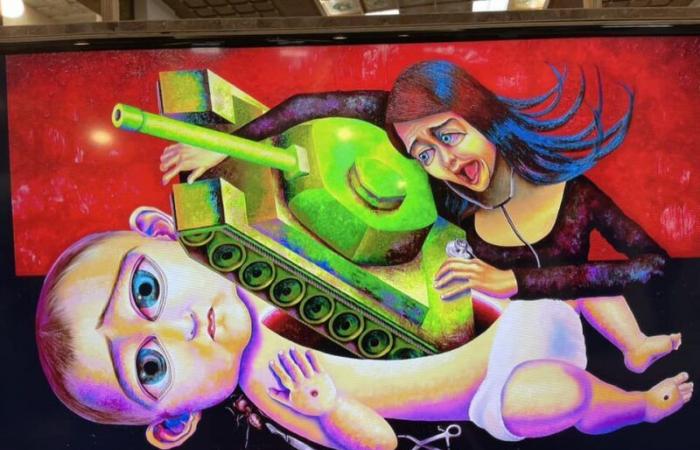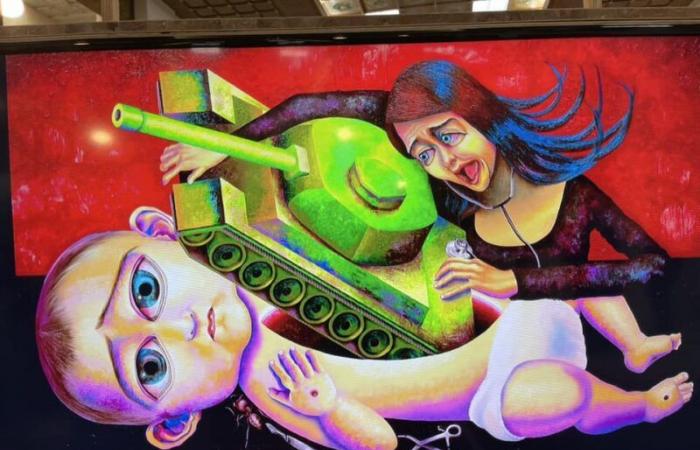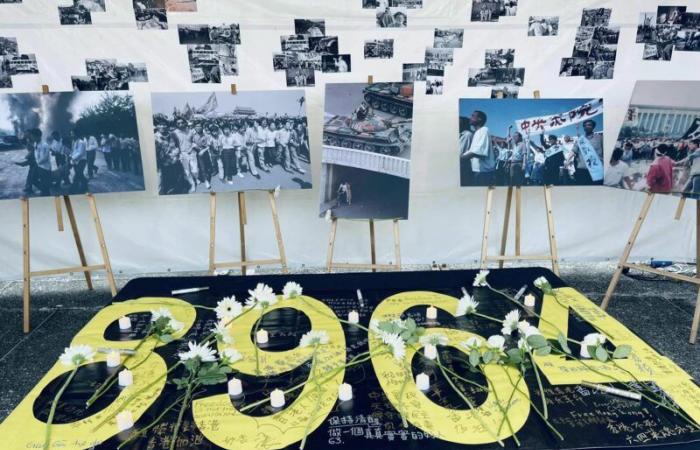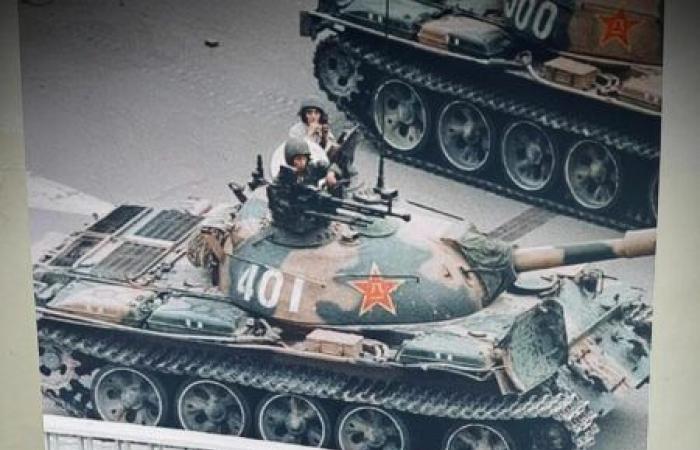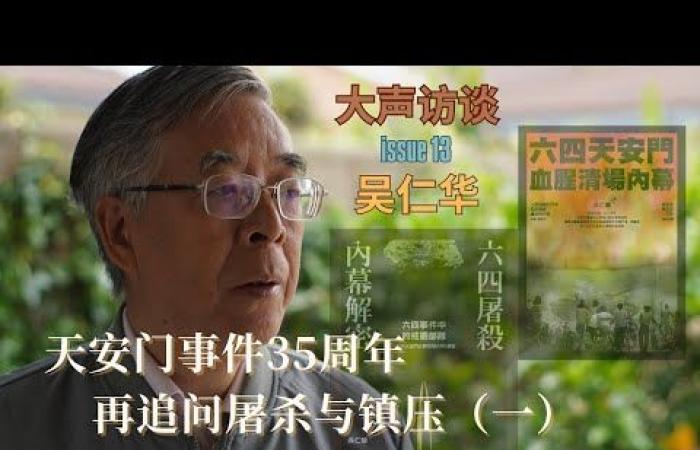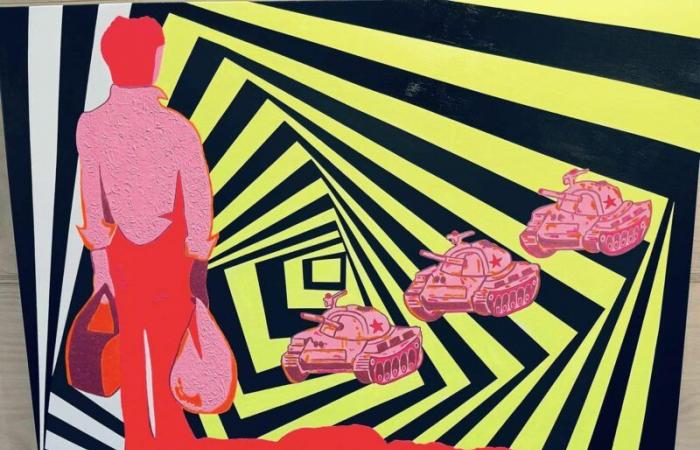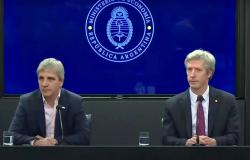Hong Kongers flocked to the June 4 commemoration in Taipei.
Painting by Lumli Lumping exhibited at the Chiang Kai-shek monument in Taipei on the occasion of the 35th anniversary of the massacre of June 4, 1989 in Tiananmen Square in Beijing. Photograph by Filip Noubel, used with permission.
This year marks 35 years since the massacre of workers and students in Tiananmen, on June 4, 1989. The protesters demanded a more democratic and egalitarian society, but the brutality that occurred not only shocked Beijing, but all of China. Currently, Taiwan is the only Chinese-speaking society in which the events can be publicly commemorated, as Hong Kong has banned any public events related to the incident.
The events of 1989 that culminated in the occupation of Tiananmen, in central Beijing, by workers, students, academics and intellectuals is known as June 4 (六四 — literally meaning 6.4., i.e. June 4). . At that time, Deng Xiaoping made the decision to crush the pro-democracy movement, and sent troops and tanks to quell it, causing hundreds of deaths. Exact figures are not known, as Beijing imposed a complete ban on speaking about that day and refuses to acknowledge that it used state violence to kill, maim, imprison and detain its citizens. In China, anyone currently mentioning 6.4. —including any allusion creatively disguised as 5.35 (as in May 35=June 4)—in public or on social media is detained, interrogated and may end up in prison, while any online reference ends up immediately deleted, and the owners of The accounts are also investigated and sanctioned.
Hong Kong was able to hold a large commemoration in Victoria Park until 2020, with large crowds attracting tens of thousands of people.
This leaves Taiwan as the only Chinese-speaking country and society that can commemorate June 4. In Taipei, the event is usually held in front of the Chiang Kai-shek monument in the city center, where people gather every June 4 for a vigil that includes artistic performances and testimonies directly from those who participated that June 4 and now They live in exile. Activists in China and around the world keep the memory alive and document and research this day to provide evidence of China’s use of state violence.
On the afternoon of June 4, 2024, around 2,000 people gathered, with a notable presence of Hong Kongers, some of whom have moved to Taiwan in search of protection for their political and human rights activism, and others who belong to the global overseas Hong Kong community.
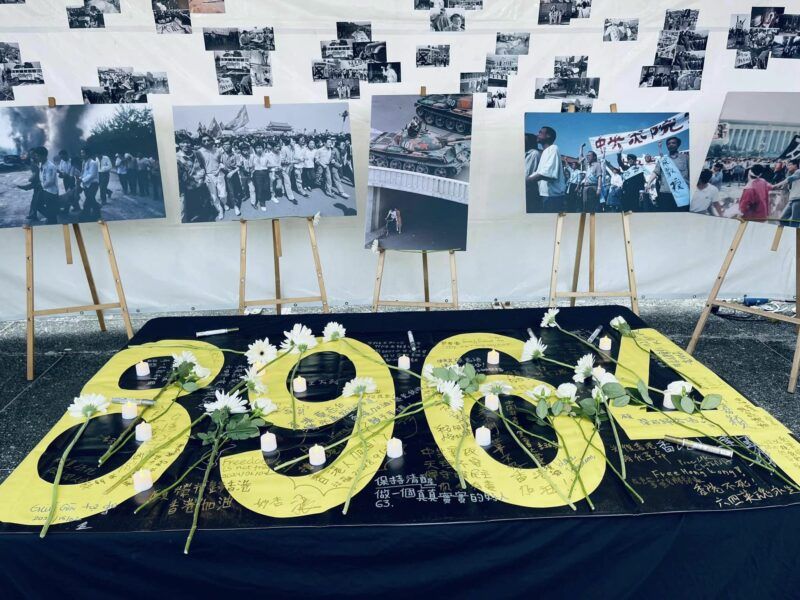
Exhibition at the June 4 vigil in Taipei. Numbers refer to June 4, 1989. Photograph by Filip Noubel, used with permission.
June 4 is not only a day to honor human rights and freedom of expression, it is also a unique emotional and intellectual space in which people with different identities but who speak Chinese: Hong Kongers, mainland Chinese, Taiwanese, Southeast Chinese Asian and overseas Chinese find common ground as they share the same values and want all Chinese-speaking societies to be free and democratic.
Global Voices spoke with three attendees of the June 4 vigil in Taipei.
Loretta Lau is a Hong Kong artist who practices artivism and, after moving to Prague in 2018, created her non-profit NGO, DEI.
He tells Global Voices:
To best preserve the memory of the Tiananmen tragedy for future generations among all Sinophone communities, including those in exile and overseas, we must wholeheartedly support Taiwan’s democracy.
Taiwan is now the last Sinophone society where we can publicly commemorate this significant, significant event, making it a crucial haven for historical truth and remembrance. Supporting Taiwan’s autonomy is essential. If we lose this, we lose our last place to openly speak the true history of the oppressed. This year, when the New School for Democracy asked me to curate the exhibition and guided imagery session, I immediately agreed. I reached out to Hong Kong artists living overseas to join the exhibition.
For many of us, participating in this event is incredibly important. Our art and voices, which can no longer be seen or heard in Hong Kong, found a platform here. Some Hongkongers, despite living just a two-hour flight away, managed to participate last night. This means so much to the Hong Kong diaspora. Making real, personal connections with people still in Hong Kong is invaluable. It shows that even under brutal regimes, people care and remember, even if they can’t openly raise their voices. By supporting Taiwan’s democracy and fostering these connections, we ensure that the memory of the Tiananmen tragedy lives on and that the voices of the oppressed are heard.
To better preserve the memory of the Tiananmen tragedy for future generations of all Sinophone communities, including those in exile and abroad, we must unconditionally support Taiwan’s democracy.
Taiwan is now the last Sinophone society in which we can publicly commemorate this important and significant event, making it a crucial refuge for historical truth and remembrance. Supporting Taiwan’s autonomy is essential. If we lose this, we will lose our last place to speak openly about the true history of the oppressed. This year, when the New School for Democracy asked me to manage the exhibition and guided imagery session, I immediately agreed. I contacted Hong Kong artists living abroad to participate in the exhibition.
For many. participating in this event is incredibly important. our art and voices, which can no longer be seen or heard in Hong Kong, find a platform here. Some Hong Kongers, despite living a two-hour flight away, were able to participate last night. This means a lot to Hong Kongers living outside the region. Making real, personal contacts with people still living in Hong Kong is invaluable. It shows that even under brutal regimes, people care and remember, even if they cannot raise their voices openly. By supporting Taiwan’s democracy and fostering these contacts, we ensure that the memory of the Tiananmen tragedy lives on and that the voices of the oppressed are heard.
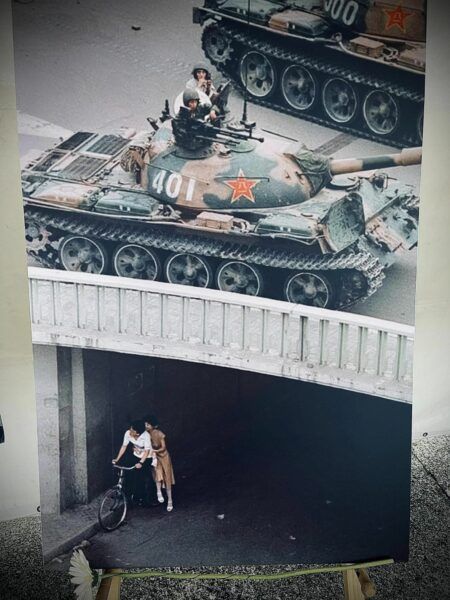
Famous photo from June 4 displayed at the Taipei vigil. Organizers allowed offerings of flowers and candles to commemorate the event. Photograph by Filip Noubel, used with permission.
Another important figure who co-led the event was Kacey Wong (黃國才), a contemporary artist from Hong Kong who moved permanently to Taiwan in 2021 and one of the main protagonists of the protest. Wong spoke in Cantonese, in honor of the presence of many Hong Kongers at the event, some wearing masks to protect her identity, even in Taiwan. Wong expresses her views to Global Voices:
I think the best way to interpret 1989 June 4th massacre is to understand it didn’t end on the date of June 4, but to understand it as it is still ongoing. In 1989 a lot of innocent people yearning for freedom and democracy were brutally murdered by CCP authoritarian government. The CCP continues to suppress other places such as first Tibet, then East Turkestan, Hong Kong and now moving to Taiwan. The mature way to understand the geo political situation is to realize this is a war of freedom and democracy versus authoritarian terror. Instead of minding our own business and burying our heads into the sand, blindly pretending it will not come to our land if we behave, is to realize this is a war between David and Goliath of the East, except there will be lots of Davids in this case, and together we will win.
I think the best way to interpret the massacre of June 4, 1989 is to understand that it did not end on that date, but is still continuing. In 1989, many innocent people who longed for freedom and democracy were brutally murdered by the authoritarian Chinese Communist Party government. This party continues to repress other places, first Tibet, then East Turkestan, Hong Kong and now moving on to Taiwan. The sensible way to understand the geopolitical situation is to understand that it is a war of freedom and democracy against authoritarian terror. Instead of minding our own business and burying our heads in the sand, blindly pretending that it won’t come to our land if we behave, we should understand that this is a war between David and Goliath of the East, except that in this case there will be many Davids, and together we will win.
Another journalist and public intellectual present is Vivian Wu (吳薇), a veteran editor with 20 years of experience at the BBC, the South China Morning Post, Inititum (端傳媒) and who has recently founded an independent global Sinophone media platform, Dasheng Media (大聲) in New York, where it is based. She tells us:
It’s emotional to see Taiwan become the last place where overseas Chinese can openly chant for democracy, commemorate June 4th, and come together to discuss their pains and bitter memories. Having covered the Victoria Park vigil in Hong Kong for years, it’s disheartening to know that such commemorations are now criminalized there after the national security law was enacted. Joint memory is formed through open and honest dialogue, something the Chinese people deeply lack. Taiwan has its own agenda on every social issue, and I’m glad to see it becoming a more steadfast fortress that safeguards values like democracy, humanitarianism, and freedom.
It is exciting to see how Taiwan becomes the last place where overseas Chinese can openly sing for democracy, commemorate June 4 and gather to talk about their sorrows and bitter memories. Having covered the Victoria Park vigil in Hong Kong for years, it is disheartening to learn that such commemorations are now criminalized there following the enactment of the national security law. Joint memory is formed through open and honest dialogue, something that Chinese people do not have. Taiwan has its own plan on all social issues, and I am glad to see that it is becoming a stronger fortress that safeguards values such as democracy, humanitarianism and freedom.
In this YouTube series (with Spanish subtitles available), he interviews Wu Renhua (吴仁华), one of the main speakers and researchers of the June 4 memory, who was also present in Taipei:
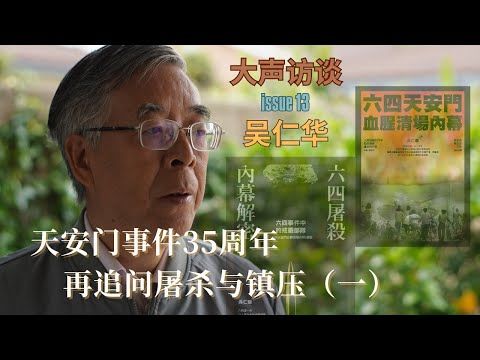
C.-J. Anderson-Wu, Taiwanese poet, translator and editor, author of a collection of short stories about the years of the Taiwanese dictatorship entitled White Terror, gives a brief answer:
我曾寫過一首關於周幸彤的詩.
Due to the situation in Hong Kong, June 4 is becoming an even more important topic for Taiwanese. Now, among places on both sides of the Taiwan Strait, only Taiwan can commemorate him publicly. I once wrote a poem about Hong Kong lawyer and activist Chow Hang-tung.
The poem he wrote in English, “There is no illegal vigil,” includes the following verses:
No one is free to express
even lighting a candle for the deceased
even trying to remind the authorities that
June Fourth is still on the calendar every yearI plead not guilty because I keep the memory
I have no intention to subvert your power
If your power is shaken by what people
are still able to remember
it is your fault, not my guilt
Nobody is free to express
nor to light a candle for the deceased
not even try to remind the authorities that
June 4 is still on the calendar every yearI plead innocent because I keep the memory
I have no intention of subverting its power.
If your power is shaken by what people
can still remember
It’s your fault, not mine.
Here is another work of art displayed at the Chiang Kai-shek monument
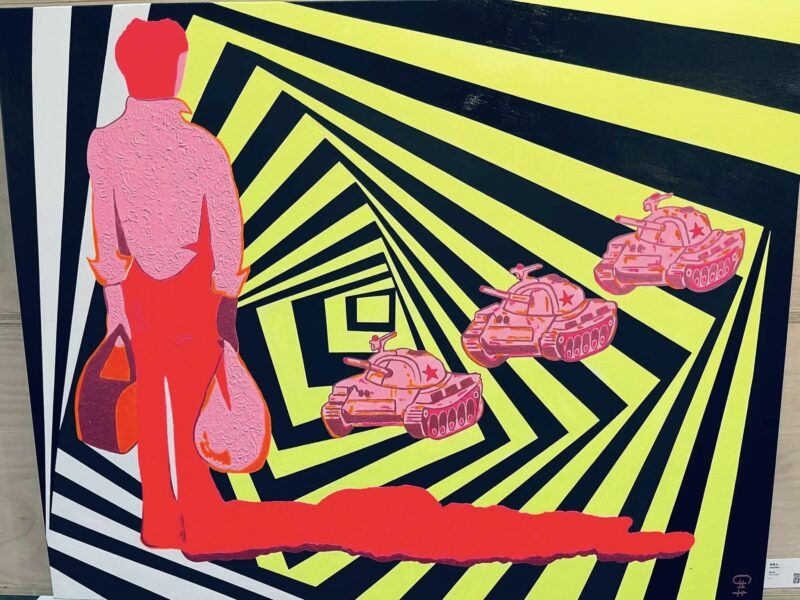
Image of Missy Hyper’s painting commemorating June 4 at the Chiang Kai-shek Memorial in Taipei. Photograph by Filip noubel, used with permission.

